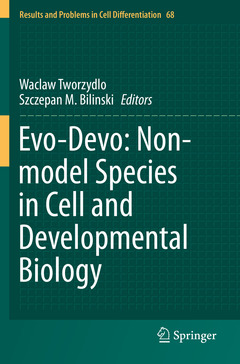Evo-Devo: Non-model Species in Cell and Developmental Biology, 1st ed. 2019 Results and Problems in Cell Differentiation Series, Vol. 68
Coordonnateurs : Tworzydlo Waclaw, Bilinski Szczepan M.

Evolutionary developmental biology or evo-devo is a field of biological research that compares the underlying mechanisms of developmental processes in different organisms to infer the ancestral condition of these processes and elucidate how they have evolved. It addresses questions about the developmental bases of evolutionary changes and evolution of developmental processes.
The book?s content is divided into three parts, the first of which discusses the theoretical background of evo-devo. The second part highlights new and emerging model organisms in the evo-devo field, while the third and last part explores the evo-devo approach in a broad comparative context. To the best of our knowledge, no other book combines these three evo-devo aspects: theoretical considerations, a comprehensive list of emerging model species, and comparative analyses of developmental processes. Given its scope, the book will offer readers a new perspective on the natural diversity of processes at work in cells and during the development of various animal groups, and expand the horizons of seasoned and young researchers alike.szczepan.bilinski@uj.edu.pl
Department of Developmenatl Biology and Invertebrate Morphology, Institute of Zoology and Biomedical Research, Jagiellonian University, Krakow, Poland.
2. Evolutionary origins of colonial development in ascidians
Federico D. Brown (co-author: Laurel Hiebert)
fdbrown@usp.br
Department of Zoology, University of Sao Paulo, Brazil
3. Development of the marsupial frogs
Eugenia M. Del Pino
EDELPINO@puce.edu.ec
School of Biological Sciences, Pontificia Universidad Católica del Ecuador,
Quito, Ecuador
4. Cell type evolution - lessons from Trichoplax adhaerens
Micheal Eitel
m.eitel@lmu.de
Department of Earth and Environmental Sciences, Ludwig-Maximilians-University of Munich, Germany
5. Hydra regeneration
Brigitte Galliot
Brigitte.Galliot@unige.ch
Department of Genetics and Evolution, University of Geneva, Geneva, Switzerland
6. Determination of animal-vegetal axes in Gastropoda/Spiralia embryos
Jonathan Henry
j-henry4@illinois.edu
Deptment of Cell and Developmental Biology, University of Illinois, Urbana, USA
7. Chelicerate type of the ovary - implications on the gonad structure and the course of oogenesis
Izabela Jedrzejowska
izabela.jedrzejowska@uwr.edu.pl
Department of Animal Developmental Biology, Institute of Experimental Biology, University of Wroclaw, Poland
8. The diversity of model systems in evolutionary developmental biology
Allan C. Love (co-author: Yoshinari Yoshida)
aclove@umn.edu
Department of Philosophy, Minnesota Center for Philosophy of Science, University of Minnesota, USA
9. Arthropod eye evolution
Victor B. Mayer-Rochow
meyrow@gmail.com
Department of Biology, University of Oulu, Finland
10. Mollusc development
Liliana Milani
liliana.milani@unibo.it
Department of Biological, Geological and Environmental Sciences, University of
Bologna, Bologna, Italy
11. Development of Xenoturbellida
Hiroaki Nakano
h.nakano@shimoda.tsukuba.ac.jp
Shimoda Marine Research Center, University of Tsukuba, Japan
12. Developmental genetics of parasitic flatworms
Peter Olson
p.olson@nhm.ac.uk
Department of Zoology, The Natural History Museum, London, United Kingdom
13. Induction of germ cells in animals
Francisco Pellegri
fjpelegri@wisc.edu
Max-Planck Institute for Developmental Biology, Tuebingen, Germany14. Signaling in protozoan cells
Helmut Plattner
helmut.plattner@uni-konstanz.de
Department of Biology, University of Konstanz, Germany
15. Gonad structure and oogenesis in the tardigrades
Izabela Poprawa
izabela.poprawa@us.edu.pl
Department of Animal Histology and Embryology, University of Silesia, Katowice, Poland
16. Non-canonical Wnt signaling during the anterior-posterior axis formation
Ryan Range
range@biology.msstate.edu
Department of Biological Sciences, Mississippi State University, Mississippi, USA
17. Cellular and molecular mechanisms in Hydra regeneration process
Puli Chandramouli Reddy
pulichandramoulireddy@gmail.com
Department of Biology, Indian Institute of Science Education and research, Puno, India
18. Cnidarians as models for early steps in the evolution of brain development
Fabian Rentzsch
Fabian.Rentzsch@uib.no
Sars International Centre for Marine Molecular Biology, University of Bergen, Norway
19. The relationship of excretory organs of the Mollusca during development and evolution
Bernhard Ruthensteiner
BRuthensteiner@zsm.mwn.de
Zoological Museum, Munchen, Germany20. Molecular mechanisms underlying Ciona intestinalis ovarian follicle growth and maturation
Honoo Satake
satake@sunbor.or.jp
Suntory Foundation For Life Sciences, Osaka, Kyoto, Japan
21. Echinoderms as a model to understand nervous system evolution
Michael Schubert (co-authors: Laurent Formery, Jenifer Croce)
michael.schubert@obs-vlfr.fr
Laboratory of Developmental Biology in Villefranche-sur-Mer, France
22. Understanding mechanisms of limb regeneration through non-model species
Yui Suzuki
ysuzuki@wellesley.edu
Science Center, Wellesley College, Wellesley, USA
23. Life history of female germline cysts in the clitellate annelids
Piotr Swiatek (co-author: Anna Z. Urbisz)
piotr.swiatek@us.edu.pl
Department of Animal Histology and Embryology, University of Silesia, Katowice, Poland
24. Paramecium cell biology
Judith Van Houten
Judith.Vanhouten@uvm.edu
Department of Biology, The University of Vermont, USA
25. Maternal control of early sea urchin development
Konstantin Yakovlevkonstantin.yakov@gmail.com
Laboratory of Cytotechnology, National Scientific Centre of Marine Biology Far
Eastern Branch of the Russian Academy of Sciences Vladivostok, Russia
Waclaw Tworzydlo received his PhD from the Jagiellonian University in 2006 and is currently Associate Professor in zoology and developmental biology at the Jagiellonian University in Krakow.
Szczepan M. Bilinski received his PhD from the Jagiellonian University in 1975 and is currently Secretary General of the Polish Academy of Arts and Sciences and Professor of zoology, cell and developmental biology at the Jagiellonian University in Krakow.
Offers a comparative analyses of developmental processes
Presents new and emerging evo-devo model organisms
Discusses theoretical background of evo-devo
Date de parution : 10-2020
Ouvrage de 551 p.
15.5x23.5 cm
Date de parution : 10-2019
Ouvrage de 551 p.
15.5x23.5 cm



